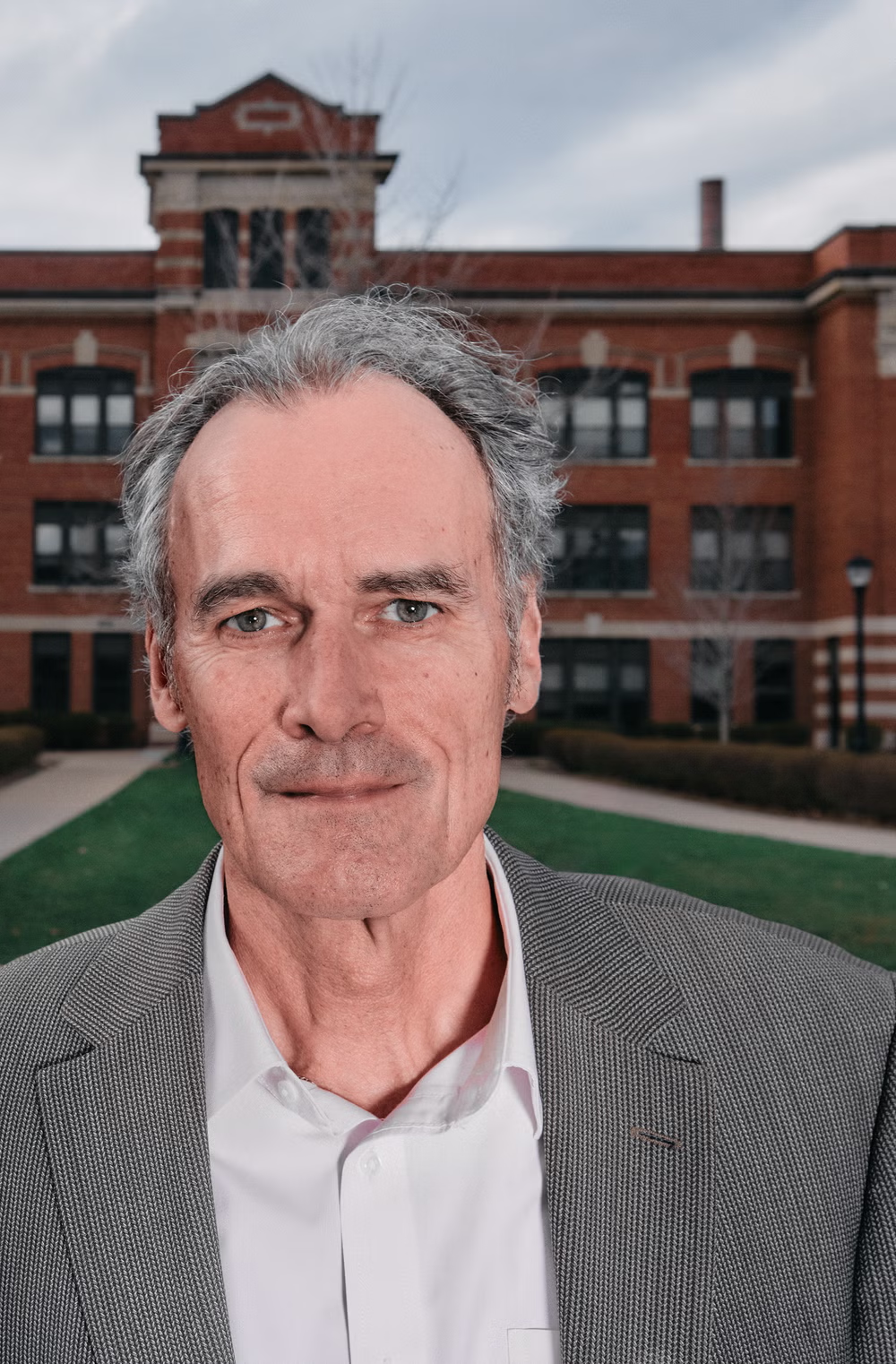The professor fired for making pornInside America’s most salacious battle over academic freedom

“If they can do this to me, they could do it to any tenured professor,” says Joe Gow. “Academia is not a law firm or a bank or an insurance company. We’re in the truth business.”
Can a tenured professor be fired for making porn? That’s the question, perhaps unprecedented in the annals of higher education, that the University of Wisconsin set out to answer last month. On September 27, the system’s board of regents sat down to rule on whether Joe Gow, who taught communications at UW-La Crosse, should be stripped of his tenure and dismissed for producing porn videos with his wife, a fellow academic named Carmen Wilson, and uploading them to Pornhub. The productions — with titles like “Juicy Anniversary” and “Vacation Sex” — featured Gow and Wilson having sex in a variety of racy scenarios, often with big-name porn stars.
Gow had been fired from his position as chancellor of UW-La Crosse, a school of 11,000 students on the banks of the Mississippi River, after someone saw the videos and forwarded them to his boss. But dismissing a tenured professor is far more complicated than firing a top executive. Academic tenure is one of the strongest job protections you can get in America. It’s effectively a lifetime appointment, designed to enable professors to teach views that might be unpopular or controversial. “It allows professors to speak truth to power, without fearing that they may lose their jobs for offending donors and the university and lawmakers,” says Zach Greenberg of the Foundation for Individual Rights and Expression. “It’s unprecedented whenever a tenured professor gets fired. It’s only happened a couple times in the history of Wisconsin.”
The university, calling Gow’s behavior “abhorrent,” went all out to make the case that he should be fired. “We don’t want to be known as Porn U,” said Betsy Morgan, who replaced Gow as interim chancellor. The university hired a white-shoe law firm to scour 11 hours’ worth of Gow and Wilson’s videos and their self-published memoirs, “Married with Benefits” and “Monogamy with Benefits: How Porn Enriches Our Relationship.” The firm produced a 318-page report brimming with detailed descriptions of the sexual techniques Gow enjoyed, along with pages of sex-toy ads that were sent to his work email. In March, Morgan started proceedings to dismiss Gow, charging him with unethical conduct, refusal to cooperate with the investigation, and violation of workplace policies. (Gow, the investigation revealed, had used a campus copier to print a vegan cookbook.)
Gow was unapologetic. He declared that he had no plans to stop making porn and argued that the university was violating his First Amendment rights. By the time the board of regents met to hear the case and issue its decision, the battle had devolved into a rancorous, often surreal showdown over the future of academic freedom in America. With private and state universities embroiled in debates over “woke indoctrination” and campus protests, many academics feared that Gow’s case could set a sweeping precedent that tenured professors can be fired over anything in their private lives that universities find inappropriate.
“It’s a violation of academic freedom,” says Tom Ginsburg, a law professor and faculty director of the Forum for Free Inquiry and Expression at the University of Chicago. “He’s being fired for embarrassing behavior outside the workplace, but there’s no end of such behavior. So once we go down this route, universities can find a pretextual reason for firing almost anyone.”
The opening round in the battle over Gow’s professorship took place at a hearing in June. The session, held in a windowless conference room of a sports arena in Onalaska, began with the bang of a gavel wielded by a UW-La Crosse biology professor. Gow was being tried not before a judge or jury but by a faculty committee made up of five of his colleagues.
The university began by arguing that Gow, as a state employee, enjoyed no right to freedom of speech. Wade Harrison, the university’s general counsel, cited San Diego v. Roe, a case in which a police officer was fired for selling videos of himself masturbating while wearing his police uniform, in effect profiting from his position.
Donald Downs, a First Amendment scholar and emeritus professor at the university, told me after the hearing he found that argument alarming. The San Diego case shouldn’t apply to Gow, he said, for one big reason: Police officers don’t have academic freedom. “If our job is going to be seen as no different from the police officer or any other regular job out there,” Downs argued, “then we’re not going to be able to do our job.”

Since being outed, Gow and his wife, Carmen Wilson, have released adult videos like “Our Honeymoon with the Porn Stars” as well as tamer fare like “Making Plant-Based Egg Salad.”
The university tried to prove that Gow had damaged its reputation, claiming that several top donors had threatened to stop giving if the star of “Bedroom Shenanigans” was allowed to teach undergrads. Harrison also placed Gow’s memoirs on trial. He recited a passage in which Gow — under the nom de plume Jay Hart — hires “Tom,” a male stripper, “to perform sex acts” with his wife.
“In ‘Monogamy with Benefits’ you wrote that all events described are true,” Harrison said. “Do you stand by that statement?”
“No,” Gow retorted. “We should have said ‘based on a true story.'”
Harrison displayed several ads Gow had received from sex-toy companies. “Do you ever get email messages you never asked for? I believe we call it spam,” Gow responded. “So you would fire someone for junk email?”
The university then trotted out Jerry Bui, a forensic investigator who had raked through Gow’s and Wilson’s work computers. The strongest evidence of misconduct he could find was that the couple had “automatic logins” to a couple of porn sites. Though he couldn’t find any browsing history of the sites, Bui speculated that Gow may have used “incognito mode” while watching porn at work or erased his browser history to cover his tracks.
Gow, in his closing argument, dismissed the trial as a sham. “Tenure is based on the quality of one’s teaching, research, and service,” he told the committee. “This fruitless exercise has nothing to do with that.”
The committee, unswayed, voted unanimously that Gow should be fired. They argued that Gow had used his academic position to promote his porn, because in some videos, during foreplay, he mentioned his “Midwestern location” and “academic career.” They also accused him of exploiting his public ouster as chancellor to boost his profile as a porn star.
But the committee’s decision was only a recommendation. More than two months later, Gow faced a second tribunal, before the board of regents for the state’s university system: 17 executives, attorneys, and public servants and one dairy farmer who gathered in Madison to hear the case. The regents had made their position clear in a brief filed before the hearing. “The survival of a public university is dependent on legislative funding, grant funding, tuition revenue, and donations,” they wrote. “Gow’s behavior, left to continue, could negatively affect all four.”
At his first hearing, Gow had defended himself. Before the regents, he was represented by Mark Leitner, a partner at a top Milwaukee law firm. Leitner argued that the university was committing a textbook violation of free-speech rights. “We don’t need the First Amendment to protect ‘The Star-Spangled Banner,'” he said. “We need the First Amendment precisely when the danger of stifling controversial, unpopular speech is at its highest.”
But what’s the danger of stifling porn? Leitner presented Gow’s videos as part of his broader advocacy of nonmonogamy. “There is no doubt that sexual conduct is a matter of importance to people,” Leitner told the regents. “Simply because Dr. Gow’s views on what promotes a healthy and stable marriage do not comport with the views of the majority of society — that doesn’t matter.”
Trustees are now going to be faced with the problem of explaining why it is that we’re going to tolerate other members of the faculty posting controversial content.
Harrison, the university’s counsel, dismissed the point: “Dr. Gow would love to, you know, try to rely on a hypertechnical First Amendment argument to get around his bad conduct.”
“It’s not a hypertechnical argument,” Leitner said. “It goes to the heart of what we’re all about in this state and in this country.”
After Leitner concluded, the regents were given a chance to ask questions. They had none.
Aweek later, the regents met again to decide Gow’s fate. After deliberating in private for half an hour, they cast their votes one by one. Seventeen supported firing Gow. One abstained.
Gow’s 40-year career in academia was over. He also forfeited some $300,000 worth of accrued sick leave and other benefits.

Gow plans to file a federal lawsuit against the university, alleging a violation of his First Amendment rights. In the meantime, he and Wilson earn as much as $3,000 a month on OnlyFans.
As Gow left the hearing, walking hand in hand with Wilson, a phalanx of photographers snapped pictures as if they were the Bennifer of Wisconsin. Gow pulled out a prepared statement. Calling the regents a “board of hypocrites,” he accused them of breaching the university’s commitment to academic freedom and of caving to pressure from Republican state senators who had called for his dismissal. The regents, Gow said, “are willing to fire me for the short-term goodwill they get with the far right.”
On his two-hour ride home, Gow elaborated on the wider issues he believes are at stake. “There are many faculty who would say: Well, this guy, he’s not one of us,” he told me. “And that’s unfortunate. Because if they can do this to me, they could do it to any tenured professor. Academia is not a law firm or a bank or an insurance company. We’re in the truth business. We are dedicated to the fearless sifting and winnowing of the truth, and that’s what this is supposed to be about.”
Gow’s colleagues apparently didn’t consider his porn videos the kind of expression that tenure is designed to protect: During his fight to remain on the faculty, none of them came to his defense in public. But Keith Whittington, a Yale law professor and founding chair of the Academic Freedom Alliance, sees Gow’s case as setting a dangerous precedent. “University trustees are now going to be faced with the problem of explaining why it is that we’re going to tolerate other members of the faculty posting controversial content,” he says. He puts Gow’s online porn in the same category as “posting inflammatory personal, political opinions on social media.” In the wake of Gow’s dismissal, he says, making such distinctions “is going to be a hard line to maintain.”
But the fight may not be over. Gow plans to file a federal lawsuit against the university, alleging a violation of his First Amendment rights. And in the meantime, he and Wilson plan to keep exercising those rights. Since being outed, they’ve released adult videos like “Top 10 Squirting Orgasms and Cumshots” and “Our Honeymoon with the Porn Stars,” as well as tamer cooking-show fare like “Making Plant-Based Egg Salad.” The videos pull in as much as $3,000 a month on OnlyFans, and the couple is getting requests to create customized content, including foot-fetish videos and gay scenes with Gow. But thrilling as their middle-aged sexual awakening has been, they say, it doesn’t compensate for the loss of Gow’s professorship.
“This is 2024,” Gow says. “We thought we had come a ways in Wisconsin from the McCarthy era. Apparently not.”





